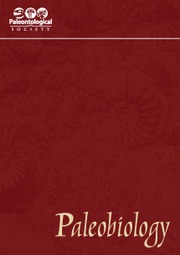Crossref Citations
This article has been cited by the following publications. This list is generated based on data provided by
Crossref.
Barnosky, Anthony D.
1994.
Defining climate's role in ecosystem evolution: Clues from late quaternary mammals.
Historical Biology,
Vol. 8,
Issue. 1-4,
p.
173.
Gould, Stephen Jay
1995.
A task for Paleobiology at the threshold of majority.
Paleobiology,
Vol. 21,
Issue. 1,
p.
1.
Lieberman, Bruce S.
and
Dudgeon, Steve
1996.
An evaluation of stabilizing selection as a mechanism for stasis.
Palaeogeography, Palaeoclimatology, Palaeoecology,
Vol. 127,
Issue. 1-4,
p.
229.
Gingerich, Philip D.
2001.
Microevolution Rate, Pattern, Process.
Vol. 8,
Issue. ,
p.
127.
GOULD, GINA C.
2001.
The Phylogenetic Resolving Power of Discrete Dental Morphology Among Extant Hedgehogs and the Implications for Their Fossil Record.
American Museum Novitates,
Vol. 3340,
Issue. ,
p.
1.
Semken, Holmes A.
and
Wallace, Steven C.
2002.
Key to Arvicoline (“Microtine” rodents) and Arvicoline-like Lower First Molars Recovered from Late Wisconsinan and Holocene Archaeological and Palaeontological Sites in Eastern North America.
Journal of Archaeological Science,
Vol. 29,
Issue. 1,
p.
23.
Hillson, Simon
2005.
Teeth.
Feranec, Robert S.
Barnosky, Anthony D.
and
Quang, Chi N.
2005.
New populations and biogeographic patterns of the geomyid rodentsLignimusandMojavemysfrom the Barstovian of western Montana.
Journal of Vertebrate Paleontology,
Vol. 25,
Issue. 4,
p.
962.
Lyman, R. Lee
and
O'Brien, Michael J.
2005.
Within-taxon morphological diversity in late-Quaternary Neotoma as a paleoenvironmental indicator, Bonneville Basin, Northwestern Utah, USA.
Quaternary Research,
Vol. 63,
Issue. 3,
p.
274.
Bell, Christopher J.
and
Bever, Gabe S.
2006.
Description and significance of theMicrotus(Rodentia: Arvicolinae) from the type Irvington fauna, Alameda County, California.
Journal of Vertebrate Paleontology,
Vol. 26,
Issue. 2,
p.
371.
Wallace, Steven C.
2006.
DIFFERENTIATING MICROTUS XANTHOGNATHUS AND MICROTUS PENNSYLVANICUS LOWER FIRST MOLARS USING DISCRIMINANT ANALYSIS OF LANDMARK DATA.
Journal of Mammalogy,
Vol. 87,
Issue. 6,
p.
1261.
Spaeth, Paula Ann
2009.
Morphological convergence and coexistence in three sympatric North American species of Microtus (Rodentia: Arvicolinae).
Journal of Biogeography,
Vol. 36,
Issue. 2,
p.
350.
McGuire, Jenny L.
2011.
Identifying CaliforniaMicrotusspecies using geometric morphometrics documents Quaternary geographic range contractions.
Journal of Mammalogy,
Vol. 92,
Issue. 6,
p.
1383.
Jass, Christopher N.
and
Bell, Christopher J.
2011.
Arvicoline rodent fauna from the Room 2 Excavation in Cathedral Cave, White Pine County, Nevada, and its biochronologic significance.
Journal of Vertebrate Paleontology,
Vol. 31,
Issue. 3,
p.
684.
Tougard, Christelle
Montuire, Sophie
Volobouev, Vitaly
Markova, Evgenia
Contet, Julien
Aniskin, Vladimir
and
Quere, Jean-Pierre
2013.
Exploring phylogeography and species limits in the Altai vole (Rodentia: Cricetidae).
Biological Journal of the Linnean Society,
Vol. 108,
Issue. 2,
p.
434.
Bose, Rituparna
and
Bartholomew, Alexander J.
2013.
Macroevolution in Deep Time.
Vol. 3,
Issue. ,
p.
17.
Markova, Evgenia A.
Smirnov, Nikolay G.
Kourova, Tatyana P.
and
Kropacheva, Yuliya E.
2013.
Ontogenetic variation in occlusal shape of evergrowing molars in voles: An intravital study in Microtus gregalis (Arvicolinae, Rodentia).
Mammalian Biology,
Vol. 78,
Issue. 4,
p.
251.
Firmat, Cyril
Lozano-Fernández, Iván
Agustí, Jordi
Bolstad, Geir H.
Cuenca-Bescós, Gloria
Hansen, Thomas F.
and
Pélabon, Christophe
2014.
Walk the line: 600000 years of molar evolution constrained by allometry in the fossil rodent
Mimomys savini
.
Philosophical Transactions of the Royal Society B: Biological Sciences,
Vol. 369,
Issue. 1649,
p.
20140057.
Martin, Robert A.
2014.
A critique of vole clocks.
Quaternary Science Reviews,
Vol. 94,
Issue. ,
p.
1.
Lyman, R. Lee
2016.
Holocene mammalian change in the central Columbia Basin of eastern Washington state, USA.
Quaternary Science Reviews,
Vol. 146,
Issue. ,
p.
66.


